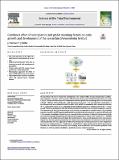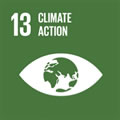Por favor, use este identificador para citar o enlazar a este item:
http://hdl.handle.net/10261/321862COMPARTIR / EXPORTAR:
 SHARE SHARE
 CORE
BASE CORE
BASE
|
|
| Visualizar otros formatos: MARC | Dublin Core | RDF | ORE | MODS | METS | DIDL | DATACITE | |

| Título: | Combined effect of microplastics and global warming factors on early growth and development of the sea urchin (Paracentrotus lividus) |
Autor: | Bertucci, Juan Ignacio; Bellas, Juan | Palabras clave: | Bioassays Centro Oceanográfico de Vigo Medio Marino y Protección Ambiental Climate change Microplastics Ocean acidification Ocean warming Sea urchin |
Fecha de publicación: | 2021 | Editor: | Elsevier BV | Resumen: | The aim of this work was to estimate the potential risk of the combined effect of global change factors (acidification, temperature increase) and microplastic (MP) pollution on the growth and development of the sea urchin P. lividus. Embryo-larval bioassays were conducted to determine growth and morphology after 48 h of incubation with MP (1000 and 3000 particles/mL); with filtered sea water at pH = 7.6; and with their combinations. A second experiment was conducted to study the effect of pH and MP in combination with a temperature increase of 4 °C compared to control (20 °C). We found that the inhibition of growth in embryos reared at pH = 7.6 was around 75%. Larvae incubated at 3000 MP particles/mL showed a 20% decrease in growth compared to controls. The exposure to MP also induced an increase in the postoral arm separation or rounded vertices. The combined exposure to a pH 7.6 and MP caused a significant decrease of larval growth compared to control, to MP and to pH 7.6 treatments. Morphological alterations were observed in these treatments, including the development of only two arms. Increasing the temperature resulted in an increased growth in control, in pH 7.6 and pH 7.6 + MP3000 treatments, but the relative stomach volume decreased. However, when growth parameters were expressed per Degree-Days the lower growth provoked by the thermal stress was evidenced in all treatments. In this work we demonstrated that MP could aggravate the effect of a decreased pH and that an increase in water temperature generated an additional stress on P. lividus larvae, manifested in a lower growth and an altered development. Therefore, the combined stress caused by ocean warming, ocean acidification, and microplastic pollution, could threaten sea urchin populations leading to a potential impact on coastal ecosystems. | URI: | http://hdl.handle.net/10261/321862 | DOI: | 10.1016/j.scitotenv.2021.146888 | ISSN: | 0048-9697 |
| Aparece en las colecciones: | (IEO) Artículos |
Ficheros en este ítem:
| Fichero | Descripción | Tamaño | Formato | |
|---|---|---|---|---|
| 26644.pdf | 2,9 MB | Adobe PDF |  Visualizar/Abrir |
CORE Recommender
SCOPUSTM
Citations
28
checked on 16-may-2024
WEB OF SCIENCETM
Citations
21
checked on 22-feb-2024
Page view(s)
13
checked on 22-may-2024
Download(s)
40
checked on 22-may-2024
Google ScholarTM
Check
Altmetric
Altmetric
NOTA: Los ítems de Digital.CSIC están protegidos por copyright, con todos los derechos reservados, a menos que se indique lo contrario.


